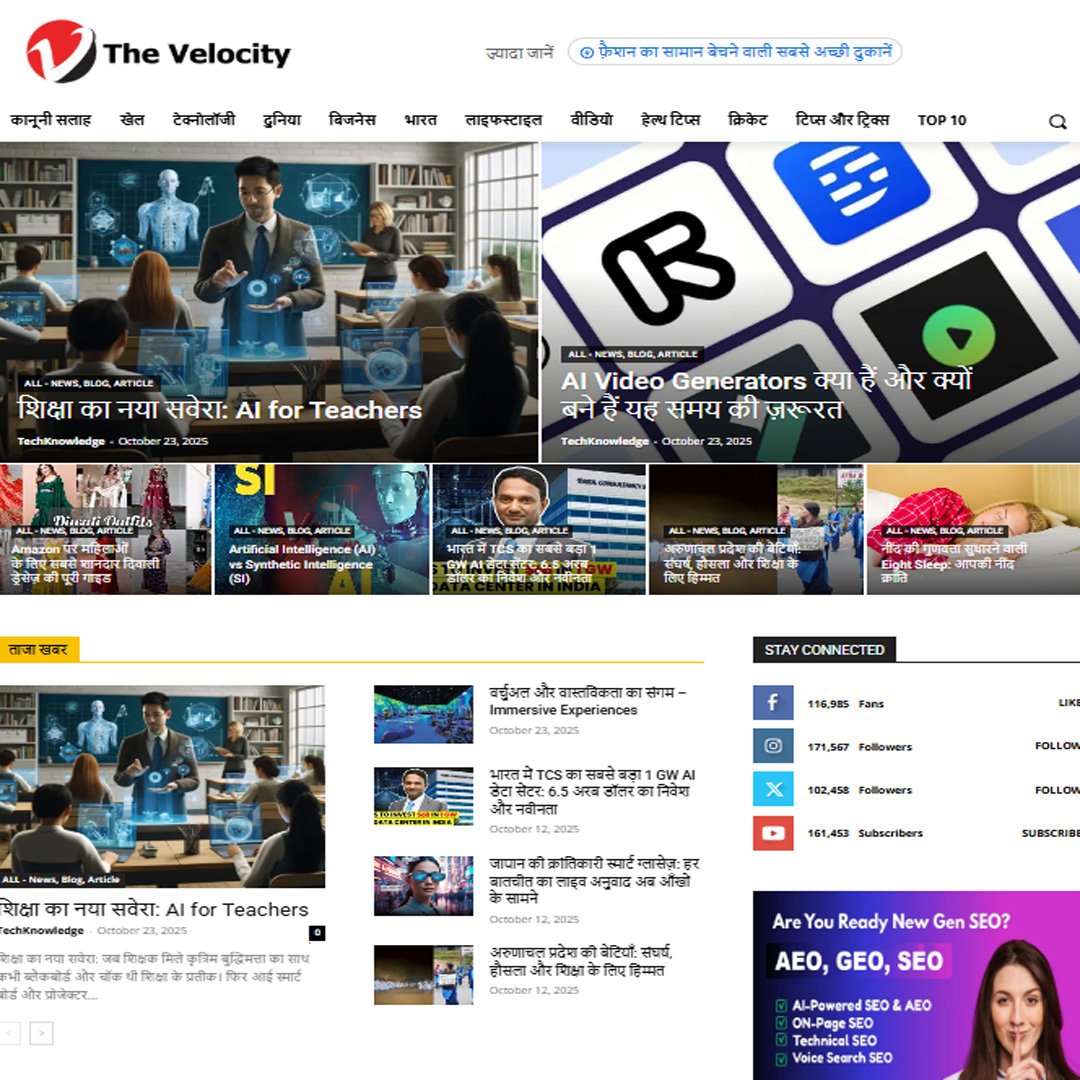Introduction: A New Age of Intelligence
In the evolving story of human innovation, few moments have promised as much potential — and peril — as the dawn of AI and Quantum Computing. Independently, they represent two of the most transformative frontiers of technology. Together, they could reshape the very architecture of thought, decision-making, and discovery itself.
Imagine a world where pattern recognition becomes instantaneous, where material science accelerates decades in months, or where climate simulations reach microscopic precision. That’s not a distant dream — it’s the emerging reality powered by the convergence of AI and Quantum Computing. And India, with its fast-growing digital ecosystem, is poised to play a pivotal role in this technological awakening.
The Machines That Think and the Machines That Compute
To understand their convergence, one must first appreciate their individuality.
Artificial Intelligence (AI) thrives on data and pattern recognition. It learns, adapts, and mimics human cognition — albeit faster and more consistently. Its algorithms thrive on massive computational resources, seeking patterns across oceans of data.
Quantum Computing, in contrast, operates not on bits but on qubits — quantum counterparts that can exist in multiple states simultaneously. This allows quantum machines to perform many calculations at once, offering exponential leaps in processing power over conventional computing.
Now imagine combining the intuitive foresight of AI with the raw, simultaneous processing capability of quantum computers. That’s where the fusion becomes revolutionary.
What Happens When AI Meets Quantum?
Here’s the magic: while AI algorithms are often slowed by the limits of today’s hardware, quantum processors can, theoretically, accelerate these computations to mind-bending speeds.
For instance:
- Quantum machine learning (QML) merges quantum algorithms with classical ML to enable faster training and pattern discovery.
- Quantum-enhanced optimization could allow AI to process complex datasets — from weather systems to financial markets — with unprecedented accuracy.
- Algorithms like Quantum Support Vector Machines (QSVMs) and Quantum Neural Networks (QNNs) could revolutionize tasks like natural language understanding, protein folding, and chemical simulations.
In 2023, IBM, Google, and startups like Rigetti computing began testing quantum processors that demonstrated noise-tolerant computations. Combine that with AI’s data interpretation modules, and you arrive at something humanity has never seen before: systems capable of learning and theorizing beyond classical barriers.
The Indian Connection – A Quantum Leap for the Subcontinent
India’s science and tech community is quietly laying the groundwork for a quantum-ready AI revolution. Institutions like IIT Madras, IISc Bengaluru, and BITS Pilani have launched interdisciplinary programs exploring AI and Quantum Computing synergy.
The Indian Quantum Mission, announced in 2023 with a ₹6,000 crore investment, aims to build indigenous quantum technologies. This mission aligns perfectly with India’s national AI roadmap — fostering an ecosystem where quantum-powered AI systems can transform sectors like healthcare, fintech, climate modeling, and national security.
Startups like QpiAI, BosonQ Psi, and TCS Research Labs are at the forefront — building real-world applications that could bridge research with enterprise-grade use cases.
Why AI Needs Quantum Computing
AI models are becoming exponentially larger — from GPT-class models to generative diffusion architectures that now require billions of training parameters. Training these models can cost millions of dollars and consume enormous computational energy.
Quantum systems could slash this cost and time by:
- Parallelizing data training using qubit superposition.
- Reducing search time in massive data optimization problems.
- Lowering energy requirements per computational cycle.
For AI researchers in India striving for sustainable and cost-effective computation, that leap could be transformative.
Imagine a quantum system at IIT Delhi training a predictive healthcare model in days instead of months — at a fraction of the cost.
Use Cases Accelerating Reality
- Finance & Risk Management
Quantum-AI models can analyze thousands of market scenarios simultaneously. Firms like JPMorgan and Goldman Sachs are already testing these systems to forecast global markets with quantum precision. - Drug Discovery
Classical AI predicts molecular interactions well, but quantum systems simulate atomic-level energy states, making pharmaceutical R&D faster. Indian pharma players like Sun Pharma’s innovation labs are watching this closely. - Climate and Energy Optimization
AI simplifies data modeling, but when paired with quantum simulators, predictions for monsoon cycles and renewable efficiency could become thousands of times more precise — a major factor for India’s energy independence goals. - Cybersecurity
Quantum encryption, paired with AI intrusion detection, could safeguard sensitive systems. The Indian defense sector has begun pilot projects in this realm, leveraging secure quantum communication networks. - Transportation and Smart Cities
AI already improves traffic flow and infrastructure planning. Quantum-based models could model entire urban ecosystems in real-time, achieving scheduling accuracy that’s currently unthinkable.
The Philosophical Edge: Rethinking Intelligence
At its core, the fusion of AI and Quantum Computing challenges humanity’s perception of intelligence. Traditional computation mimics our brains linearly — processing bit by bit. But quantum logic mimics nature’s uncertainty, reflecting how human intuition often works: probabilistic, contextual, adaptive.
That’s why researchers view this convergence not merely as an engineering breakthrough but as a profound redefinition of how intelligence is generated.
Will we reach artificial consciousness? Or merely a higher form of computation?
It’s an open question — one that resonates across universities, startups, and global think tanks.
Data and Statistics: The Numbers Behind the Narrative
- According to IDC Research (2024), the global market for quantum AI solutions is expected to cross $9.2 billion by 2030.
- India’s quantum market alone may see a 35% CAGR growth over the next five years (India AI Council, 2024).
- Google’s Sycamore processor recently performed a calculation in 6 minutes that would take a classical supercomputer 47 years — illustrating the scale of computational transcendence quantum architectures offer.
If such capabilities are merged with AI policymaking tools, financial modeling, or agricultural planning, India could leapfrog into a new digital dominance era — powered by indigenous innovation and AI governance ethics.
The Challenges – Noise, Error, and Ethics
For all its promise, AI and Quantum Computing face significant hurdles.
Quantum systems are fragile — small vibrations or temperature changes can collapse quantum states. Maintaining coherence across multiple qubits remains one of the hardest engineering problems in modern science.
Meanwhile, integrating AI’s data demands with quantum’s probabilistic logic introduces new cybersecurity and interpretability challenges.
Who controls the algorithmic decisions?
How transparent are the machine’s thought processes when operating at quantum speed?
These are questions that Indian policymakers, particularly under the National Quantum Mission, need to address urgently.
Emotional Core – The Human Story Amid the Tech Race
Technology without emotion is machinery. What’s remarkable about this AI-quantum renaissance is how deeply human its implications remain.
Consider this: A doctor in Hyderabad diagnoses rare diseases using quantum-enhanced AI imaging; a farmer in Nagpur accesses precise rainfall prediction models; a student in Guwahati trains neural simulators on quantum cloud systems through KnowTheAI.in’s learning portal.
These are not science fiction vignettes — they are near-term realities. The blend of AI and Quantum Computing promises not just more power, but more possibility. It symbolizes humanity’s timeless pursuit — to understand, predict, and create through curiosity and computation.
Education, Economy, and Workforce: India’s Quantum-AI Roadmap
India’s future workforce must evolve fast. The integration of AI and Quantum Computing demands hybrid skills — from quantum algorithm design and AI model training to data governance and ethics.
Policies like Digital India Mission 2.0 and Startup India Quantum Grants are creating the right push. Universities are responding too —
- IIT Bombay introduced India’s first master’s in Quantum Technology.
- BITS Pilani’s AI Innovation Lab, in collaboration with KnowTheAI.in, launched a community initiative to guide students in quantum-AI project design.
- Companies like Infosys, Wipro, and Tech Mahindra have begun pilot training programs in quantum software development.
Such initiatives will cultivate the next generation of Indian engineers, not as users of foreign technology, but as pioneers of new intelligence frameworks.
Looking Ahead – Quantum Algorithms Revolutionizing AI Models
Let’s glimpse into tomorrow’s landscape:
- Quantum Reinforcement Learning (QRL) could train robots with near-human learning agility.
- Hybrid Quantum-Classical AI models will integrate data from standard GPUs and quantum chips in real time.
- Quantum Federated Learning might enable secure learning across distributed devices, preserving privacy for India’s massive population datasets.
- In creative AI domains, quantum acceleration could unlock near-infinite variations in music, design, and content generation — redefining digital creativity itself.
Every layer of this transformation hints at exponential acceleration, pushing human innovation toward a new frontier — one where limits blur, and computation feels indistinguishable from intuition.
The Global Competition and India’s Role
Globally, nations are racing.
The U.S., China, and European Union are fueling billions into quantum-AI convergence programs. India’s unlike them — its ambitions are rooted in democratized access, open learning platforms like KnowTheAI.in, and collaborations between the public and private sectors.
Whether in fintech, healthtech, or education, India’s “Quantum Bharat Vision 2030” seeks not to dominate, but to empower — to ensure that citizens, not just corporations, benefit from this revolution.
That democratization of intelligence — where breakthroughs are accessible through cloud Quantum-AI APIs — might well be India’s greatest contribution to the digital century.
Conclusion: The Dawn of Synthetic Intuition
As we stand at the edge of this new era, one truth becomes clear: the convergence of AI and Quantum Computing is not merely about faster processing. It’s about fostering a deeper, almost intuitive partnership between man and machine.
History will remember this period not as the rise of smarter computers — but as the moment when humanity’s own intelligence evolved through its creations.
From India’s research labs to its startups, from policymakers to students logging into KnowTheAI.in, the quest is not just for smarter algorithms — but for quantum empathy, quantum understanding, and quantum purpose.
The quantum age of AI isn’t coming.
It’s already here — and it’s transforming what it means to think.
For more insights, research collaborations, and updates on India’s AI and Quantum frontier, visit KnowTheAI.in or contact us to join the conversation shaping tomorrow’s intelligence.









